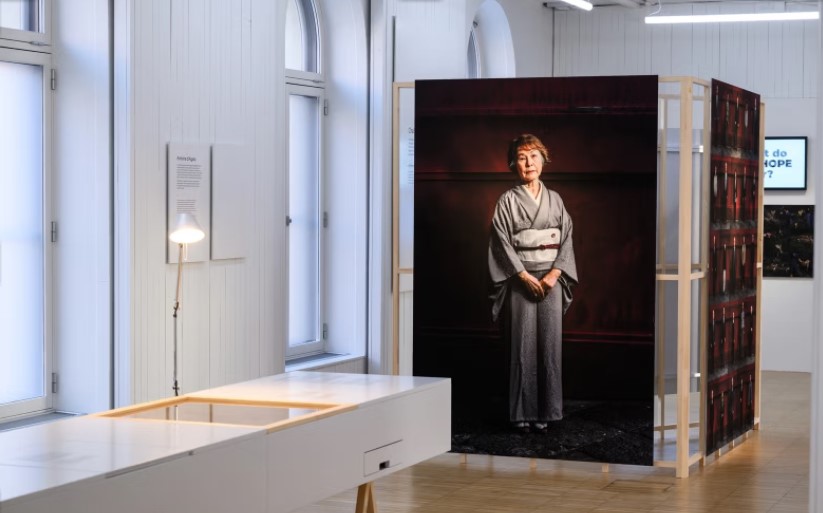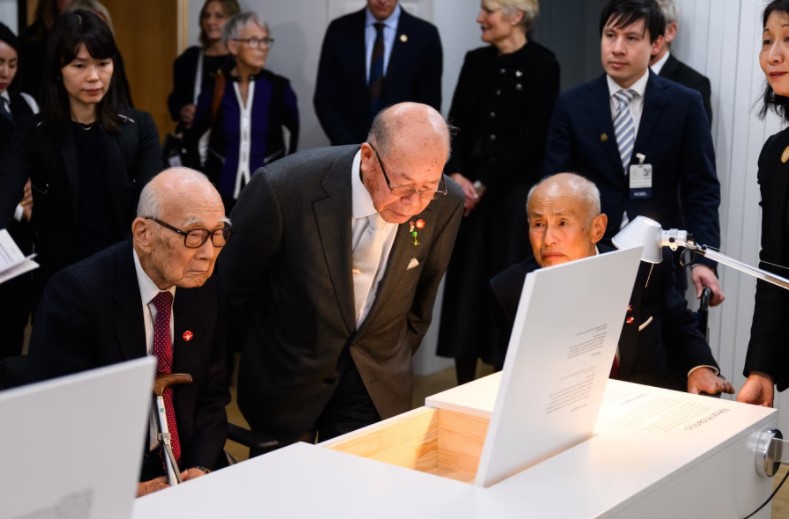
Newsroom
Beneath the polished facade of Madrid's bustling streets, 84-year-old Shigemitsu Tanaka, a survivor of the Nagasaki atomic bombing, carries a haunting fragment of the past. From a simple cream-colored towel, he unfurls a small, blackened piece of roof tile. “In three seconds, it turned into this,” he says softly, holding it up for a captivated audience. “Imagine the effect that the nuclear explosion had on human beings.”
Tanaka, co-president of Nihon Hidankyo—the organization of hibakusha, or atomic bomb survivors—has spent the last quarter-century recounting a message forged in fire. Now, in the wake of the organization’s receipt of the 2024 Nobel Peace Prize, his voice carries new weight.
The unbearable legacy of August 9, 1945
Tanaka was just four years old when the bomb detonated over Nagasaki. “I was in the garden with my grandfather and brother when I saw the blinding white light,” he recalls. His family lived six kilometers from the epicenter and fled to the mountains for safety. Initially, they bore no visible injuries. But like many hibakusha, the true toll surfaced over time.
“My mother developed thyroid and liver problems. My father died of cancer 12 years later, and my brother followed. Even my grandson was born with severe health issues and lived only three days,” Tanaka says. Though medical confirmation remains elusive, he feels the shadow of the bomb in his genetic lineage. “I feel guilty and afraid,” he admits.
A new mission in the face of old wounds
After decades of working as a train driver, Tanaka’s life changed in 2000 when he survived a heart attack. It was then that he decided to devote himself to activism. Joining Nihon Hidankyo, he began guiding tours, inspecting sites, and sharing his story with students visiting Nagasaki.
“It’s the clearest way to understand why nuclear weapons should be banned,” he explains. His mission has taken him from the remnants of Nagasaki to cities around the world, including a recent visit to Spain, where he advocated for the nation to sign the Treaty on the Prohibition of Nuclear Weapons (TPNW).
‘The nuclear taboo is no longer taboo’
As a witness to humanity’s capacity for destruction, Tanaka’s alarm at the current geopolitical landscape is palpable. “The world is certainly more dangerous today,” he says. “The belief that nuclear weapons should not be used—the nuclear taboo—is no longer so taboo. Nations are openly threatening their use.”
He points to technological advancements that make modern weapons even more terrifying. “The bomb dropped on Nagasaki is like a homemade device compared to what exists today. Some are physically half its size but exponentially more destructive.”
A Nobel Prize, but the fight continues
The Nobel Peace Prize brought newfound recognition to Nihon Hidankyo’s mission, but Tanaka knows the battle is far from over. “When they announced we had won, everything changed. The world finally knew we existed,” he says. Yet, despite this spotlight, Japan’s government has remained hesitant to embrace the TPNW or provide adequate support for hibakusha.
“We are the only country to have suffered atomic bombings, yet our authorities seemed to hide from it. Thousands of people, especially women, could have led better lives with proper care and compensation,” Tanaka laments.
For women hibakusha, the scars—both visible and invisible—were particularly isolating. “They were ostracized, struggled to marry, and were treated as if they carried some kind of curse,” he explains.
A call to sction for the next generation
Tanaka believes the key to a nuclear-free future lies with young people. “They need to hear these stories, join anti-nuclear groups, and educate themselves,” he urges. “It’s up to them to ensure these weapons are banned forever.”
His journey to Spain underscores the urgency of his plea. Addressing leaders like Prime Minister Pedro Sánchez, Tanaka’s message is clear: “Nuclear weapons are incompatible with human survival. In a nuclear war, there are no winners—only devastation.”
Living history, bearing witness
For Tanaka, his most poignant moment in decades of activism was the Nobel Prize announcement. It symbolized a global acknowledgment of the hibakusha and their enduring testimony. “We are living proof of a history that must not be repeated,” he says.
As he folds the towel back over the charred tile fragment, the weight of his mission remains evident. “This is not just my story,” Tanaka emphasizes. “It is humanity’s story. And it is our duty to ensure it never happens again.”
With information from EL PAÍS English and The Nobel Peace Center.
































